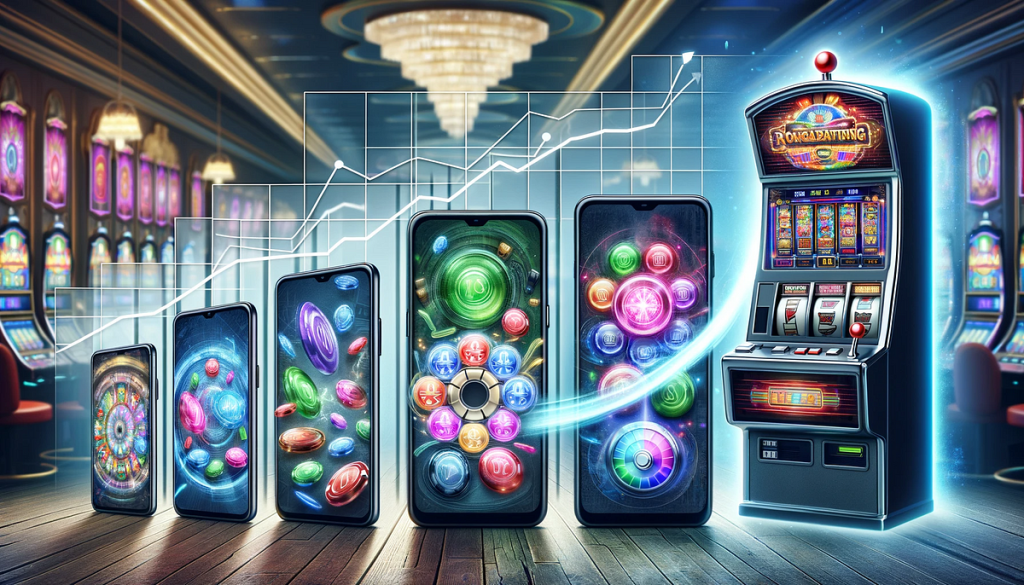The history of slot games dates back to the late 19th century, with the invention of the first mechanical slot machines. These early machines were simple, featuring three spinning reels and a limited number of symbols. Players would pull a lever to set the reels in motion, hoping that they would align to form a winning combination. The simplicity of these machines belied their impact on the gambling industry, as they quickly became a popular attraction in bars and casinos.

Technology played a crucial role in the creation of these early slot machines. The mechanical components, including gears, levers, and springs, were carefully designed to ensure that the reels spun freely and stopped randomly. Despite the lack of electronic components, these machines laid the foundation for the slot games we know today, introducing the basic mechanics that would continue to evolve over the next century.
The introduction of mechanical slot machines marked the beginning of a new era in gambling. These machines provided a form of entertainment that was easy to understand and accessible to a wide audience. Unlike table games, which required skill and strategy, slot machines were based purely on luck, making them appealing to both novice and experienced gamblers. The success of these early machines set the stage for the technological advancements that would soon revolutionize the industry.
The Transition to Electromechanical Slot Machines
The next major leap in the evolution of slot games came in the mid-20th century with the development of electromechanical slot machines. These machines combined mechanical components with electronic circuitry, allowing for more complex gameplay and a wider range of features. The addition of electrical components enabled the introduction of new elements such as flashing lights, sound effects, and automatic payouts.
One of the most significant innovations during this period was the replacement of the traditional lever with a button, which players would press to start the game. This change not only made the machines more user-friendly but also increased their appeal to a broader audience. The introduction of electronic components also allowed for more sophisticated random number generators (RNGs), which ensured that the outcomes of each spin were truly random and fair.
Electromechanical slot machines represented a significant advancement in the gambling industry. They offered more engaging and immersive experiences, with enhanced graphics, sound, and gameplay features. The ability to incorporate electronic components also paved the way for the introduction of multiple paylines, bonus rounds, and progressive jackpots, further increasing the excitement and potential rewards for players. This era of innovation set the stage for the next major evolution in slot games: the advent of video slots.
The Rise of Video Slot Machines
The late 20th century saw the rise of video slot machines, which revolutionized the industry by replacing physical reels with digital displays. Video slots were made possible by advances in computer technology, which allowed for the creation of virtual reels, animated graphics, and more complex gameplay. These machines offered a level of flexibility and creativity that was not possible with mechanical or electromechanical machines.
The introduction of video slots allowed game developers to experiment with a wide range of themes, characters, and narratives. No longer limited by physical constraints, video slots could feature multiple paylines, interactive bonus rounds, and rich, immersive graphics. This flexibility led to a proliferation of themed slot games, ranging from classic fruit machines to elaborate adventures based on popular movies, TV shows, and cultural icons.
One of the most significant developments in video slot technology was the ability to incorporate progressive jackpots. Progressive jackpots are pooled across multiple machines or even multiple casinos, allowing for the accumulation of massive prize pools that can reach millions of dollars. The possibility of winning life-changing sums of money added a new level of excitement to slot gaming, attracting a new generation of players and further cementing the popularity of slot games in casinos around the world.
The Emergence of Online Slot Games
The advent of the internet in the 1990s brought about a new era in the evolution of slot games, with the emergence of online casinos and online slot games. This technological shift allowed players to enjoy their favorite slot games from the comfort of their own homes, without the need to visit a physical casino. Online slot games quickly gained popularity due to their convenience, accessibility, and the wide variety of games available.
Online slot thailand super gacor games offered several advantages over their land-based counterparts. For one, they allowed for greater creativity in game design, with developers able to create games with hundreds of paylines, 3D graphics, and intricate bonus features. Additionally, online slots could be easily updated with new themes and features, keeping the experience fresh and engaging for players.

The rise of online casinos also introduced new opportunities for social interaction, with multiplayer slots and community-based bonus features becoming increasingly popular. These features allowed players to compete against each other or work together to unlock special rewards, adding a new social dimension to the slot gaming experience.
Moreover, online slot games benefited from the use of advanced RNG technology, ensuring that the outcomes of each spin were truly random and fair. This technology was critical in maintaining player trust and ensuring the integrity of the games, as players could be confident that the games were not rigged or manipulated.
The Impact of Mobile Technology on Slot Gaming
The introduction of smartphones and mobile technology in the 2000s brought about another significant shift in the evolution of slot games. Mobile gaming allowed players to enjoy their favorite slot games on the go, anytime and anywhere. This level of accessibility and convenience led to a surge in the popularity of mobile slot games, with millions of players downloading and playing slot games on their smartphones and tablets.
Mobile technology enabled the development of slot games that were specifically designed for small screens, with touch controls and optimized graphics. This allowed for a more intuitive and user-friendly experience, as players could easily spin the reels and access bonus features with just a few taps on their screens. The portability of mobile devices also meant that players could enjoy short gaming sessions during their commutes, while waiting in line, or during breaks, further increasing the appeal of mobile slot gaming.

In addition to convenience, mobile technology also allowed for the integration of social features and real-time multiplayer options, enhancing the social aspect of slot gaming. Players could connect with friends, compete in tournaments, and share their achievements on social media, creating a more interactive and engaging experience. The ability to play slot games with friends and compete for high scores added a new layer of excitement to mobile slot gaming, attracting a new generation of players.
The Future of Slot Games: Virtual Reality and Beyond
As technology continues to evolve, the future of slot games looks promising, with emerging technologies such as virtual reality (VR) and augmented reality (AR) poised to take the gaming experience to new heights. VR slot games offer an immersive experience that transports players into a fully interactive 3D environment, where they can interact with the game in ways that were previously unimaginable.
Imagine stepping into a virtual casino, walking up to a slot machine, and pulling the lever with a realistic hand gesture. The reels spin in front of you, and the environment reacts to your actions, with lights flashing and sounds surrounding you. VR technology has the potential to create a deeply immersive and engaging experience, making players feel like they are physically present in the game.
In addition to VR, AR technology could bring slot games to life in new and exciting ways. AR allows players to overlay digital elements onto the real world, creating a mixed-reality experience. For example, players could use their smartphones or AR glasses to see slot machines appear on their kitchen tables or in their living rooms, bringing the excitement of the casino into their everyday lives.
Furthermore, advances in artificial intelligence (AI) and machine learning could lead to more personalized and adaptive slot games. AI algorithms could analyze player behavior and preferences to create customized gaming experiences, offering personalized bonuses, tailored themes, and dynamic difficulty levels. This level of personalization could enhance player engagement and satisfaction, creating a more enjoyable and rewarding gaming experience.
Conclusion: Technology as the Driving Force Behind Slot Game Evolution
The evolution of slot games has been driven by advancements in technology, from the early mechanical machines to the sophisticated digital platforms of today. Each technological leap has brought new features, greater creativity, and enhanced player experiences, making slot games one of the most popular forms of entertainment in the world.

As we look to the future, the continued integration of cutting-edge technologies such as VR, AR, and AI promises to push the boundaries of what is possible in slot gaming. These innovations will not only create more immersive and interactive experiences but also open up new opportunities for social interaction, personalization, and player engagement. The role of technology in the evolution of slot games is far from over, and the future of slot gaming is poised to be more exciting and dynamic than ever before.


Leave a Reply